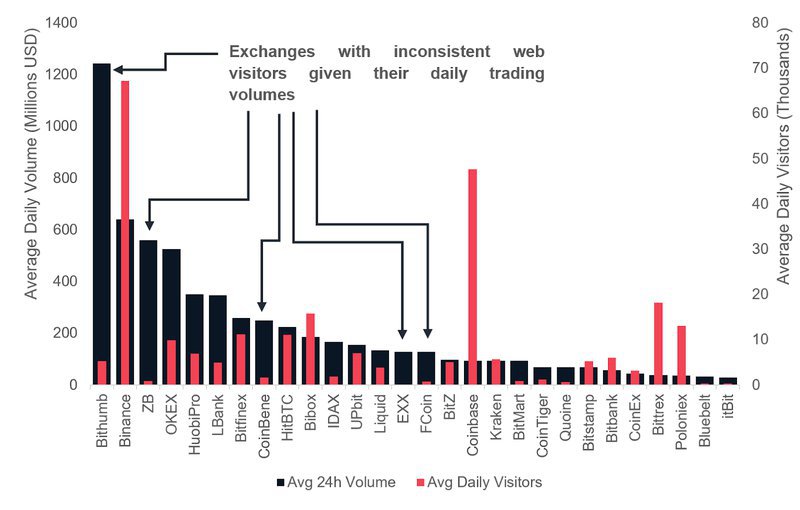/latest/2018/12/crypto-exchange-bithumb-denies-wash-trading-allegations-as-critics-mount/
South Korean cryptocurrency exchange Bithumb has recently denied wash trading allegations levied against it by cryptocurrency exchange rating service CER, which claims the company faked trading volumes in the second half of this year.
According to Forbes, CER claims Bithumb was removed from crypto data aggregator indexes like CryptoCompare’s Aggregate Pricing Index (CCCAGG) as it has been inflating its trading volume through artificial activity. Gleb Myrko, CER’s marketing lead, was quoted as saying:
- Judging from our multifaceted investigation on Bithumb charts we see the signs of trade volumes manipulations, specifically, wash trading.
Some of the examples CER cited for its allegations include average transaction sizes ballooning in short amounts of time, and trading volumes jumping in specific times, as well as odd trade patterns. Per CER, BTC transactions on September 9 totaled 7,600 in five minutes, a volume that equaled 94% of the day’s volume.
The crypto exchange’s goal, the organization suggests, was to establish itself as the number one exchange in the world. CryptoGlobe was notably one of the first to break the story on Bithumb’s apparent wash trading, at a time in which it claimed the title of leading crypto exchange.
As covered in November, Bithumb was airdropping coins to traders who, taking advantage of large fee discounts, traded specific amounts. It was also posting about a “today’s coin” on social media, which saw specific cryptocurrencies surge on the platform. Bithumb’s strange activities appeared to stop on November 11, three days after CryptoGlobe’s report.
CryptoCompare’s November Exchange Review report later on addressed Bithumb’s situation, and noted its average daily trading volumes surged by over 280% from $323 million to $1.2 billion in a short amount of time. This, while its unique daily visitors decreased by nearly 20%.
Notably, its data showed Bithumb became the number one crypto exchange by trading volume while having little over 5,000 users a day. In comparison, Binance had 67,200 unique visitors per day, with an average daily trading volume of $600 million. This showed Bithumb grew thanks to “incentivized trading.”
 Source: CryptoCompare Exchange Review
Source: CryptoCompare Exchange Review
The South Korean exchange’s volume increased so much that the trading volume of BTC into Korean Won (KRW) increased 288% in November. The exchange’s volumes surged after Singapore-based BK Global Consortium acquired a controlling share in the exchange for $350 million. The organization reportedly implemented a “series of airdrop competitions, raffles, rebates, and other programs” to bring in non-Korean users.
Bithumb Denies Allegations
Notably Forbes managed to get a response from the cryptocurrency exchange, which claimed it doesn’t inflate trading volumes. In the past, as covered, it had claimed it was difficult to “accurately measure the volume of transactions based on data of one counting website.” Speaking to Forbes, a representative stated:
Bithumb is doing nothing to inflate trading volume. Bithumb is not selling mining-based coin. Bithumb is trying to get more customers by providing various promotions just like any other company in the world as a normal business.
While available data clearly suggests the exchange’s promotions have been heavily influencing its trading volumes, whether it has engaged in wash trading isn’t clear. CER itself is a service created by Hacken Ecosystem, which has its own community token – but claims to have never tried to list it on Bithumb.
CER is set to publish all of its data in the near future, according to Forbes. Various experts the publication contacted seemingly didn’t find it hard to believe exchanges wash trade to inflate volumes. Aryeh Altshul, the CRO of a blockchain consultancy firm, claimed it’s “the normal practice in crypto.”
Crystal Clare Stranger, the founder and CEO of blockchain-based payroll company PeaCounts, argued it’s a possible, even common practice as in “the crypto space it is common to follow the adage of ‘fake it ’til you make it’ and many people grossly exaggerate how successful they are.”
Stranger added:
It is very easy for a centralized exchange to trade dummy accounts off-chain using bots to pop volume. And as the exchange themselves bear little cost for these transactions, essentially just the computing cost, [it becomes]very tempting, especially with so many exchanges opening in the last couple years. It is a very competitive market.
Notably Bithumb’s decentralized exchange (DEX) also saw suspicious trading volumes. As reported last month its CXTC/ETH trading pair was showing over 25,000 ETH had changed hands in a day, although all of CXTC’s trading volume on other platforms was of 310 ETH at the time.
Currently, the same pair’s trading volume has dropped to zero on the platform. Currently, Bithumb’s website suggests over $1.7 billion were traded on it in the last 24-hour period, as its charts keep showing odd trading patterns.







